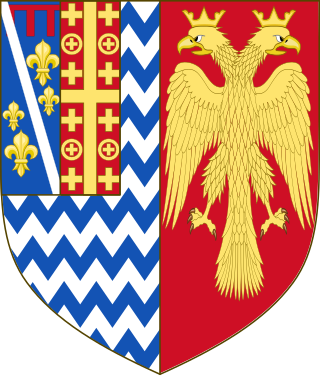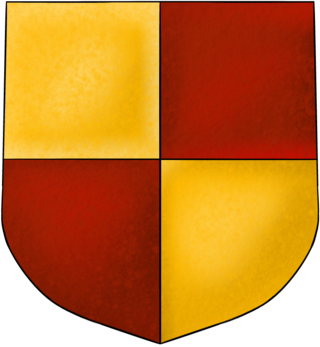
Carlo de Tocco (11 August 1592 - 14 February 1674), titular Duke of Leucada and Prince of Montemiletto, was an Italian aristocrat, nobleman and military officer.

Carlo de Tocco (11 August 1592 - 14 February 1674), titular Duke of Leucada and Prince of Montemiletto, was an Italian aristocrat, nobleman and military officer.
Tocco was born into the Tocco family that had previously ruled the Republic of Genoa during the 14th century and the Despotate of Epirus during the 15th century.
His father was Giovanni di Tocco, consignore di Refrancore and his grandfather Leonardo IV Tocco. [1]
Tocco fought during the 30 Years' War for the Holy Roman Empire. In 1642 he was made a Knight of the Order of the Golden Fleece. [2]

The despot of Epirus was the ruler of the Despotate of Epirus, one of the successor states of the Byzantine Empire in the aftermath of the Fourth Crusade. The name "Despotate of Epirus" and the title "despot of Epirus" are modern historiographical names, and were not in use by the despots themselves. In the Byzantine Empire, the title of despot was a prestigious court title and did not designate rule over some specific territory. Though several of the early Greek rulers of the Epirote realm did use the title of despot, it was never in reference to the lands they governed, but instead in reference to their position in the imperial hierarchy.
Carlo I Tocco was the hereditary Count palatine of Cephalonia and Zakynthos from 1376, and ruled as the Despot of Epirus from 1411 until his death on July 4, 1429.
Carlo II Tocco was the ruler of Epirus from 1429 until his death.
Leonardo III Tocco was the last ruler of the Despotate of Epirus, ruling from the death of his father Carlo II Tocco in 1448 to the despotate's fall to the Ottoman Empire in 1479. Leonardo was one of the last independent Latin rulers in Greece and the last to hold territories on the Greek mainland. After the fall of his realm, Leonardo fled to Italy and became a landowner and diplomat. He continued to claim his titles in exile until his death.

Centurione II AsanesZaccaria, scion of a powerful Genoese merchant family established in the Morea since the marriage of the lord of Chios Martino Zaccaria to the baroness Jacqueline de la Roche. Centurione was installed as Prince of Achaea by Ladislaus of Naples in 1404 and was the last ruler of the once Latin Empire not under Byzantine suzerainty.

The Chronicle of the Tocco is a chronicle in fifteen-syllable blank verse written in medieval Greek. It covers the period of 1375-1425 and focuses on the ascent of the Tocco family, and especially Carlo I Tocco, Count palatine of Cephalonia and Zakynthos, to the rule over the Despotate of Epirus, as well as Carlo's conquest of territories in the Morea.

The County Palatine of Cephalonia and Zakynthos existed from 1185 to 1479 as part of the Kingdom of Sicily. The title and the right to rule the Ionian islands of Cephalonia and Zakynthos was originally given to Margaritus of Brindisi for his services to William II, King of Sicily, in 1185.
Theodora Tocco was the first wife of Constantine Palaiologos while he was Despot of Morea. Her husband would become the last Emperor of the Eastern Roman Empire.

The Despotate of Arta was a despotate established by Albanian rulers during the 14th century, after the defeat of the local Despot of Epirus, Nikephoros II Orsini, by Albanian tribesmen in the Battle of Achelous in 1359 and ceased to exist in 1416, when it passed to Carlo I Tocco.
Muriki or Maurice Shpata was the ruler of Arta from late 1399/early 1400 until his death in 1414 or 1415. Muriq’s reign was dominated by his wars with Carlo I Tocco. Muriq was able to defend his capital of Arta, but despite some victories failed to prevent the fall of Ioannina to Tocco. As a result, his brother Yaqub Shpata who succeeded him was defeated in October 1416, ending the Despotate of Arta.

The House of Tocco was an Italian noble family from Benevento that came to prominence in the late 14th and 15th centuries, when they ruled various territories in western Greece as Counts Palatine of Cephalonia and Zakynthos and Despots of Epirus. During their brief period of rule in Greece, they were one of the most ambitious and able Latin dynasties in the region, and they were one of the few to leave descendants lasting until modern times.
Guglielmo Tocco was the governor of the Greek island of Corfu in the 1330s and the founder of the Tocco dynasty.

Leonardo I Tocco was the count palatine of the islands of Cephalonia and Zakynthos from 1357 until his death, and later lord of Ithaca, Lefkada, and the port of Vonitsa as well.
Leonardo II Tocco was a scion of the Tocco family and lord of Zakynthos, who played an important role as a military leader for his brother, Carlo I Tocco, in early 15th-century western Greece.
Carlo III Tocco (1464–1518) was the titular despot of Epirus and count palatine of Cephalonia and Zakynthos from the death of his father Leonardo III Tocco c. 1503 to his own death in 1518. Carlo lived in Rome, where he received pensions from both the Papacy and the Kingdom of Naples. As an adult, Carlo worked as a military officer, serving both the Papacy and Emperor Maximilian I.
Milica Branković was a Serbian princess and the first wife of Leonardo III Tocco, whom she married on 1 May 1463. She was a daughter of despot Lazar Branković of Serbia and Helena Palaiologina. Milica died in childbirth in 1464, while giving birth to Carlo III Tocco. Carlo III Tocco succeeded his father as titular ruler of Epirus (Arta) and Zakynthos. Her siblings were Maria, wife of King Stephen Tomašević of Bosnia and Jerina, wife of Gjon Kastrioti II.
Jevdokija Balšić, died after 1428), was a Zetan aristocrat and regent. She was the wife of Esau de' Buondelmonti, despot of Ioannina. She was regent of Ioannina during the minority of her son in 1411.
Francesca Acciaioli or Acciajuoli was the wife of Carlo I Tocco, Count Palatine of Cephalonia and Zakynthos.
Don Antonio Tocco was the last titular Despot of Epirus and Count Palatine of Cephalonia and Zakynthos, claiming these titles from the death of his father Leonardo V Tocco in 1641 until he abandoned them in 1642, substituting them for the title of Prince of Achaea, which he used until his death in 1678.
Don Carlo Antonio Tocco was a 17th-century Italian noble, serving as the Prince of Montemiletto and the titular Prince of Achaea from the death of his grandfather Antonio Tocco in 1678 to his own death in 1701.